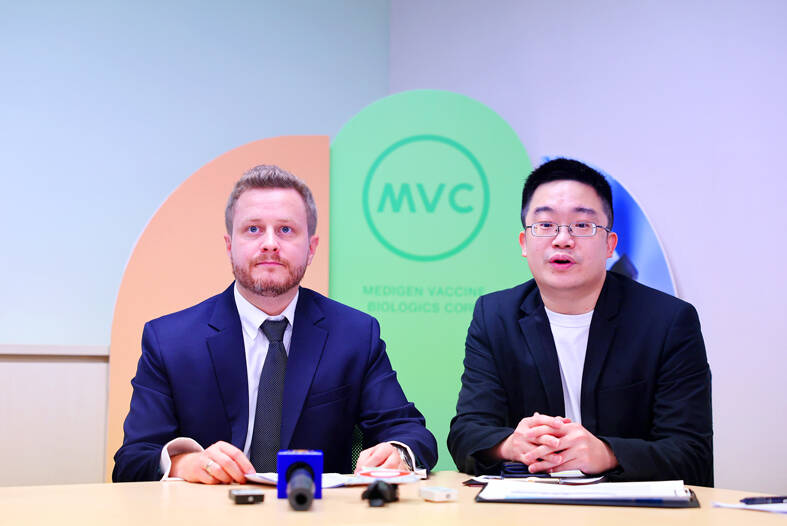The WHO’s addition of Medigen Vaccine Biologics Corp’s (高端疫苗) COVID-19 vaccine to its pool marks the first time the world body has authorized a Taiwan-made vaccine and it is an endorsement of the country’s vaccine industry, Minister of Health and Welfare Hsueh Jui-yuan (薛瑞元) said yesterday.
Medigen on Tuesday announced an out-licensing agreement with the WHO’s COVID-19 Technology Access Pool (C-TAP) and the UN-backed Medicines Patent Pool, which makes its vaccine technology available to people in need worldwide.
Pharmaceutical companies are required to provide toxicology results, animal and clinical trial statistics, as well as production data for the C-TAP initiative to review, Hsueh said, adding that the information requirements do not differ significantly from an application to the Food and Drug Administration for emergency use authorization.

Medigen Biotechnology Corp international business development director Paul Torkehagen, left, and company spokesman Chen Cheng-yan attend a news conference in Taipei yesterday.
Photo: CNA
C-TAP’s announcement was an affirmation of Taiwan’s vaccine manufacturing industry, he said.
Advisory Committee on Immunization Practices head Lee Ping-ing (李秉穎) said that the WHO’s approval of Medigen’s vaccine speaks volumes, as the organization examined the vaccine with the help of experts, and deemed that the manufacturing process and technology are mature.
Medigen’s vaccine has had fewer adverse reactions than other messenger RNA (mRNA) or adenoviral vector vaccines, Lee said.
Many of the WHO-validated COVID-19 vaccines also used immune-bridging, but they were not required to pass phase three trials due to provisions allowed in emergency use.
An international body authorizing a vaccine developed using government funds is “a good thing,” Lee said.
Shih Shin-ru (施信如), a professor in Chang Gung University’s Research Center for Emerging Viral Infections, said that authorization of Medigen technology for WHO use would allow other countries and companies to develop non-mRNA-based vaccines to help protect people who previously had adverse reactions or cannot receive mRNA-based vaccines.
Source: Taipei Times - 2023/08/31




















